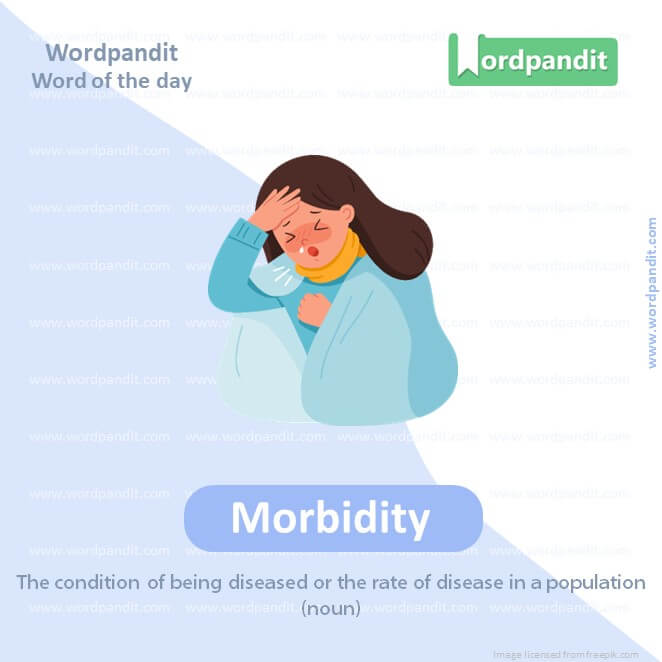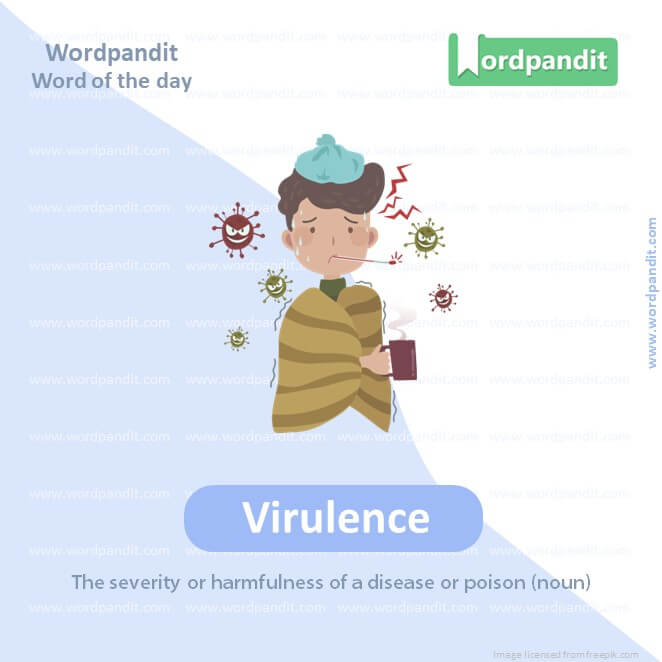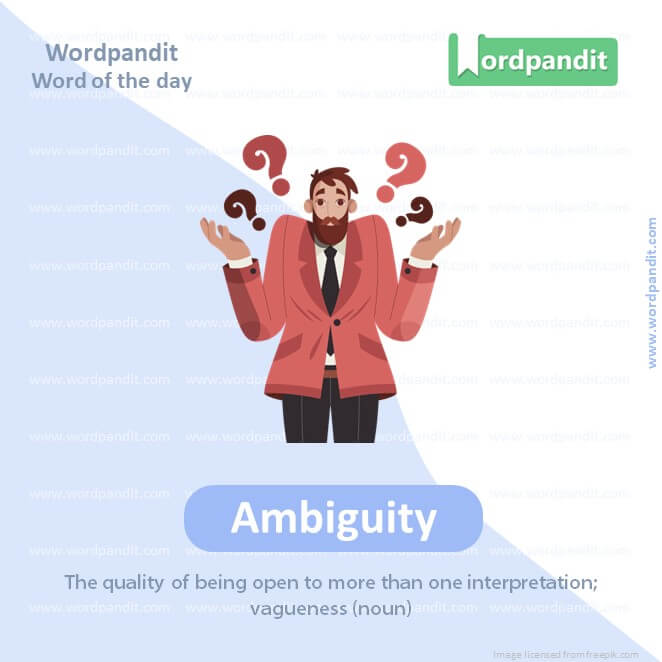Daily Vocabulary Words: List of Daily Used Words
Hi there. Welcome to this special section @ Wordpandit.
Our endeavour here is straightforward: highlighting important daily vocabulary words, you would encounter in The Hindu. This is your repository of commonly used words; essentially, we are posting a list of daily used words. Hence, this has significant practical application as it teaches you words that are commonly used in a leading publication such as The Hindu.
Visit the website daily to learn words from The Hindu.

WORD-1: Morbidity
CONTEXT: The double burden of morbidity that India faces from communicable and non-communicable diseases will be worsened by climate change.
SOURCE: The Hindu
EXPLANATORY PARAGRAPH: Morbidity is like when people talk about how many are getting sick or the kinds of sicknesses that are happening.
MEANING: The condition of being diseased or the rate of disease in a population (noun).
PRONUNCIATION: mor-bid-uh-tee
SYNONYMS: Illness, sickness, unhealthiness, diseased state, infirmity, ailment, malady.
USAGE EXAMPLES:
1. The study focused on the morbidity rate of the disease.
2. Doctors discussed the morbidity associated with unhealthy lifestyles.
3. The morbidity of the outbreak was alarming.
4. She specializes in the morbidity of chronic diseases.

WORD-2: Virulence
CONTEXT: Heat also alters the virulence of pathogens.
SOURCE: The Hindu
EXPLANATORY PARAGRAPH: Virulence is like how strong and harmful a sickness can be, such as a very bad cold that makes you feel really sick.
MEANING: The severity or harmfulness of a disease or poison (noun).
PRONUNCIATION: veer-yuh-luhns
SYNONYMS: Potency, toxicity, lethality, deadliness, harmfulness, severity, aggressiveness.
USAGE EXAMPLES:
1. The virulence of the virus was unexpected.
2. Scientists studied the virulence of the new strain.
3. The infection’s virulence worried the doctors.
4. He recovered from a disease of high virulence.
WORD-3: Accentuated
CONTEXT: the impact is accentuated by socio-economic conditions, having systems in place for social support and health services will reduce the impact.
SOURCE: The Hindu
EXPLANATORY PARAGRAPH: Accentuated is like making something more noticeable or easier to see, like when you draw a line under a word to make it stand out.
MEANING: Made more noticeable or prominent (verb).
PRONUNCIATION: ak-sen-choo-ay-tid
SYNONYMS: Highlighted, emphasized, underscored, intensified, stressed, amplified, heightened.
USAGE EXAMPLES:
1. Her dress accentuated her blue eyes.
2. The lighting accentuated the colors of the painting.
3. His speech accentuated the importance of teamwork.
4. The decorations accentuated the festive atmosphere.
WORD-4: Disseminate
CONTEXT: the fact check unit will disseminate creative contents through its social media platforms to create awareness.
SOURCE: The Hindu
EXPLANATORY PARAGRAPH: Disseminate is like spreading something far and wide, like when you share a bunch of seeds in the garden so plants can grow everywhere.
MEANING: Spread or disperse widely (verb).
PRONUNCIATION: di-sem-uh-nayt
SYNONYMS: Spread, distribute, circulate, broadcast, propagate, publicize, promulgate.
USAGE EXAMPLES:
1. The organization aimed to disseminate important information.
2. He helped disseminate the seeds in the field.
3. The internet is a powerful tool for disseminating ideas.
4. Flyers were disseminated to advertise the event.

WORD-5: Pertinent
CONTEXT: It is also pertinent to note that “public interest” is not a ground under Article 19(2) to restrict the freedom of speech and expression.
SOURCE: The Hindu
EXPLANATORY PARAGRAPH: Pertinent is like something that is really important and related to what you’re talking about, like when you talk about toys while playing.
MEANING: Relevant or applicable to a particular matter; fitting (adjective).
PRONUNCIATION: pur-tuh-nuhnt
SYNONYMS: Relevant, applicable, germane, apropos, appropriate, fitting, related.
USAGE EXAMPLES:
1. She asked a question that was pertinent to the subject.
2. The lawyer presented pertinent evidence in the case.
3. It’s important to stay pertinent during discussions.
4. He made several pertinent observations.

WORD-6: Ambiguity
CONTEXT: This ambiguity will have a chilling effect on the freedom of speech and expression of Indian citizens.
SOURCE: The Hindu
EXPLANATORY PARAGRAPH: Ambiguity is when something can be understood in more than one way, like a riddle with two possible answers.
MEANING: The quality of being open to more than one interpretation; vagueness (noun).
PRONUNCIATION: am-bi-gyoo-uh-tee
SYNONYMS: Uncertainty, vagueness, unclearness, obscurity, indistinctness, equivocation, doubtfulness.
USAGE EXAMPLES:
1. The ambiguity of the poem made it intriguing.
2. Her statement was full of ambiguity.
3. They debated the ambiguity in the law’s wording.
4. To avoid ambiguity, they clarified the instructions.
WORD-7: Riddled
CONTEXT: The GO is riddled with other illegalities.
SOURCE: The Hindu
EXPLANATORY PARAGRAPH: Riddled is like having a lot of something all over, like when your sweater is covered in lots of little fuzz balls.
MEANING: Full of (usually something unpleasant or problematic) (adjective).
PRONUNCIATION: rid-uld
SYNONYMS: Infested, permeated, full, beset, plagued, swarming, teeming.
USAGE EXAMPLES:
1. The old house was riddled with termites.
2. His speech was riddled with errors.
3. The manuscript was riddled with typos.
4. The plot was riddled with inconsistencies.
WORD-8: Necessitated
CONTEXT: hate speech have necessitated the creation of the fact check unit by the State government.
SOURCE: The Hindu
EXPLANATORY PARAGRAPH: Necessitated is like needing something to be done, like needing to clean up your toys so your room is neat.
MEANING: Made necessary as a result or consequence (verb).
PRONUNCIATION: nuh-ses-i-tay-tid
SYNONYMS: Required, demanded, compelled, called for, warranted, obliged, imposed.
USAGE EXAMPLES:
1. The situation necessitated quick action.
2. His absence necessitated a change in plans.
3. The error necessitated a revision of the document.
4. The breakdown necessitated a call to the mechanic.
WORD-9: Compatriots
CONTEXT: the founder of India’s iconic business house, Infosys, has issued something akin to a challenge to his compatriots.
SOURCE: The Hindu
EXPLANATORY PARAGRAPH: Compatriots are people from the same country as you, like friends who live in the same place and celebrate the same holidays.
MEANING: People from the same country (noun).
PRONUNCIATION: kom-pay-tree-uhts
SYNONYMS: Countrymen, fellow citizens, nationals, compadres, cohorts, peers, comrades.
USAGE EXAMPLES:
1. He greeted his compatriots with enthusiasm.
2. The athletes were cheered on by their compatriots.
3. She shared her experiences with her compatriots.
4. The leader addressed his compatriots in a speech.

WORD-10: Exhort
CONTEXT: there is unemployment, to exhort workers to work longer hours is somewhat irrelevant, even when it is not meant to be callous.
SOURCE: The Hindu
EXPLANATORY PARAGRAPH: Exhort is like encouraging someone strongly to do something, like cheering for your friend to finish a race.
MEANING: Strongly encourage or urge to do something (verb).
PRONUNCIATION: ig-zort
SYNONYMS: Urge, encourage, press, persuade, implore, adjure, entreat.
USAGE EXAMPLES:
1. The coach exhorted the team to play their best.
2. He exhorted his friends to join the cause.
3. The speaker exhorted the audience to take action.
4. She exhorted them to study harder for the exam.
vocabulary correction
Vocabulary correction plays a critical role in enhancing the eloquence of our verbal and written communication. It is necessary to conquer the nuances of a language and get the message across clearly.
Learning vocabulary correction shouldn’t come across as a daunting task laden with an overbearing list of complicated words. In fact, it’s a lifelong journey that evolves continuously with constant learning and usage. So, how exactly does one embark on this journey of vocabulary correction?
Initially, it’s essential to read extensively. Make books, newspapers, blogs and scholarly articles your best friends. They are the potential wellsprings of words waiting to enrich your vocabulary. As you come across unfamiliar words or phrases, have a dictionary and thesaurus handy to comprehend their meanings and usage.
Next, regularly engaging in vocabulary games and quizzes is a fun method of vocabulary correction that shouldn’t be understated. Not only does it expand your knowledge, but it also tests your current vocabulary prowess. Word puzzles, crosswords, and language learning mobile applications offer great platforms for this.
Writing is another powerful tool for effective vocabulary correction. Jotting down thoughts, ideas, or chronicling day-to-day experiences helps us weave words together, enhancing our vocabulary use. You look for the right words to express yourself, and in the process, you learn the correct usage of previously unfamiliar words.
No course of vocabulary correction is complete without active conversation. Engaging in meaningful dialogues introduces us to different styles and manners of speech. We pick up new words and expressions that we may not stumble upon during solitary reading or writing.
Lastly, vocabulary correction involves continuous practice and diligence. Language learning is not a one-and-done deal. It’s a consistent task of engaging, experimenting, and adapting. Remember, vocabulary correction can be monumentally effective education; make sure you learnt it the right way.










